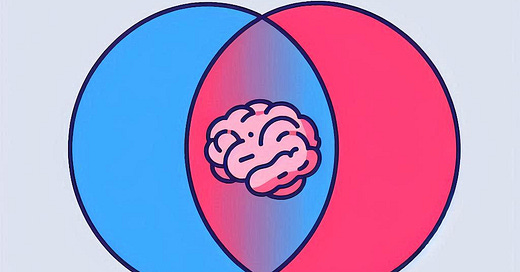What exactly is a wise mind?
An important concept to help us navigate the uncertainty of the coming years
I gave much consideration to the question of what I should title my series of essays here on Substack. It was important to find something that would capture the main focus of my writings – the high state of anxiety occurring in our uncertain sociopolitical climate. However I also wanted to express an element of optimism – something to convey that people do have the ability to manage their anxiety in healthy ways. In a stroke of inspiration, I conceived “Wise Mind in Anxious Times”. One question inevitably follows: “What exactly is a wise mind?”
The concept of “wise mind” derives from a specific type of psychotherapy called dialectical behavioral therapy (DBT). While many different types of people can potentially benefit from DBT, it was originally designed as a treatment for individuals with a diagnosis called borderline personality disorder (BPD).
BPD is a complex diagnosis, with many varied clinical manifestations. However, the main hallmark of BPD is a pervasive pattern of intense emotional instability. Individuals with BPD experience dramatic mood swings that often feel uncontrollable to them. They can exhibit impulsive emotional outbursts in response to relatively minor stimuli.
In such cases, we would say that these individuals are acting with an “emotional mind”. Their actions are reflexive responses to their internal feelings, without giving much regard to logic or consequences. In its most extreme form, someone acting with purely an emotional mind might resemble a young toddler throwing a temper tantrum. As we know, young children do not fully understand the logic of the adult world, and they have not yet learned the most appropriate ways to deal with unpleasant feelings. While such behaviors are typical in children, we are expected to act in more mature ways as adults.
The counterpoint to the “emotional mind” is what we call the “rational mind”. We use a rational mind when we are behaving in a very logical, reasoned way, not letting ourselves be distracted by emotional pulls. As children grow and learn more about the world, they become more capable of acting with a rational mind. Individuals with BPD lack the fundamental emotional regulation skills that most of us have as adults; they are very prone to operating with an emotional mind and have difficulty accessing their rational mind.
While a rational mind is important in many ways, it too can be problematic when taken to extremes. We do not want to be so detached from our emotions that we ignore them completely. It is not healthy for us to become hyper-logical automatons that disregard our own feelings.
This is where the concept of “wise mind” emerges. It is essentially the integration of the emotional mind and rational mind. When we act with a wise mind, we make a concerted effort to use logic and reason, and mindfully consider the consequences of our actions. However, we also stay aware of our emotional state and use our emotions in a healthy way to better understand a given situation. We allow ourselves to acknowledge and experience our emotions while also not letting them overwhelm us.
The concept of “wise mind” is one that can serve us well in the coming years, as we experience tumultuous national and global events that will inevitably stir up strong emotions. We will all reach situations in which those strong feelings will pull us to respond in excessive, unhealthy ways – in essence, these would be situations in which our emotional mind takes over. We may be tempted to act in ways that in hindsight would be unproductive and regrettable. Common examples might include: picking political fights with others, severing relationships with friends and family with differing political views, or wasting time with doomscrolling and obsessing on imagined catastrophes.
As we experience stressful sociopolitical events, we must be careful to not let intense emotions dictate our behavior. We must make a mindful effort to make reason and logic part of our decision-making. Before impulsively acting on your feelings when a stressful event occurs, pause and reflect. Ask yourself some questions: Am I responding to this issue in a healthy and productive way? Might my words and actions hurt my relationships with others? Will my response actually make me feel better, or am I risking making myself feel even more anxious or angry?
However we do not want to be completely blind to our emotional responses to sociopolitical developments – hence, the importance of the wise mind. First for all, it is impractical to try to suppress and ignore our feelings. Efforts to do so will be unsuccessful and will merely frustrate us. Anger, anxiety, and disappointment are all natural human feelings. We should give ourselves permission to acknowledge and experience them. Also, our feelings often can give us useful information about a given situation. Provided that we do not overreact to our emotions, they can be a helpful tool for us. In the best of circumstances, we can channel those intense emotions into positive actions.
Regardless of our political inclinations, we will all be challenged by stressful sociopolitical happenings over the next four years. Maintaining a wise mind will help us weather the stress and respond to these events in a healthy, productive way.




